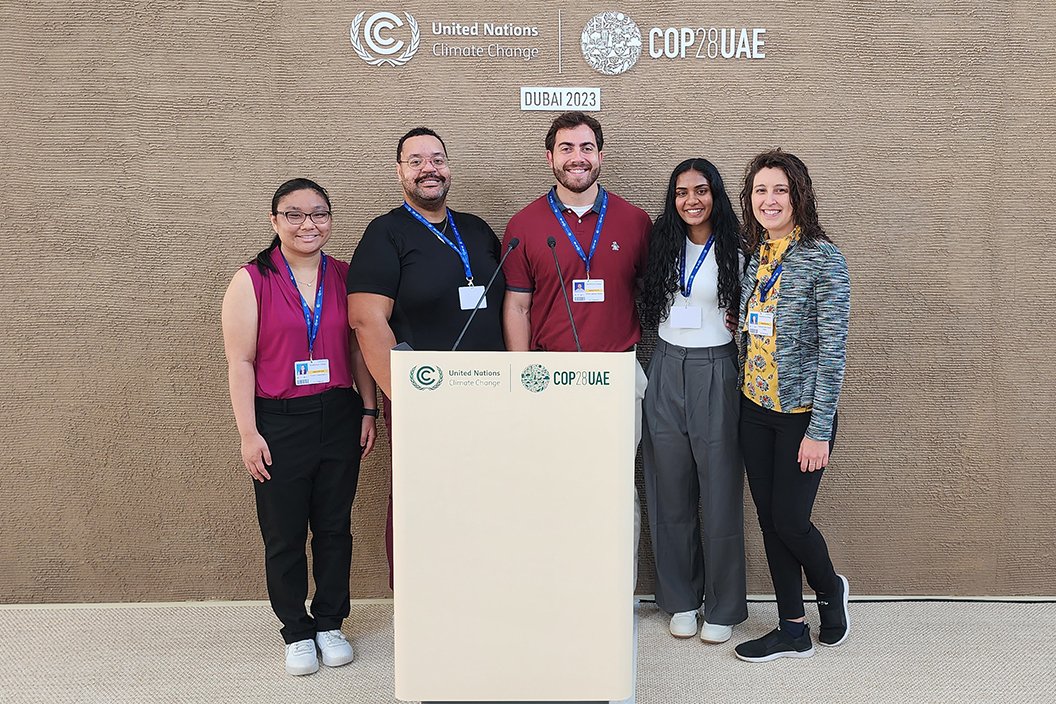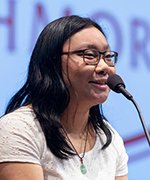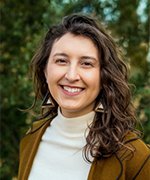Swarthmore Contingent Shares Takeaways of U.N. Climate Change Conference in Dubai

From left: Emmy Li ’25, James Padiolini, Ethan Weiss ’25, Oviya Kumaran ’24, and Hannah Ulloa.
A group of Swarthmore students, staff, and faculty attended the United Nations Foundation Climate Change Conference (COP28) in Dubai in December, witnessing and contributing to international unity against the existential threat of climate change.
Three Swarthmore students — Oviya Kumaran ’24, Emmy Li ’25, and Ethan Weiss ’25 — documented the conference over the course of two weeks. They shared perspectives on a range of issues, including climate change policy and implementation, biodiversity and habitat protection, and power imbalances between large and small nations.
Among the highlights of their experience at COP28:
- Encountering the People’s Plenary, an event at which representatives of Indigenous peoples, youth, women, people with disabilities, environmental NGOs, and climate justice activists spoke in solidarity.
- Observing the development of the Global Stocktake document, in which nearly 200 countries pledged to move away from fossil fuels in the waning hours of the conference.
- Attending events at the UN Environment Programme (UNEP) Pavilion that showcased climate action solutions and shed light on the roles of robust science, data, transparency, and climate justice.
- Collaborating with a student from Pomona College, who joined the Swarthmore contingent on the trip.
The College first received NGO-observer status in 2013, and has sent a delegation to each summit thereafter. Sources of support have also included Global Studies, Environmental Studies, and the Office of Sustainability.
Hannah Ulloa, climate action manager (Sustainability), and James Padilioni, visiting assistant professor of religion and environmental studies, co-led an independent study this past fall to help the students prepare for the conference content and travel. The students brought shared interests in climate finance, carbon market mechanisms, global negotiating structures, and the Global Stocktake, says Ulloa.
Below, four members of the 2023 Swarthmore contingent reflect on this year’s conference.
 Emmy Li ’25, an economics and environmental governance and policy special major from Richmond, Va.
Emmy Li ’25, an economics and environmental governance and policy special major from Richmond, Va.
“COP28 will be remembered by the operationalization of the Loss and Damage Fund, an agreement to triple the world’s renewable energy capacity by 2030, the completion of a draft text on the Global Stocktake, and the first time there is any mention toward the 'transition away from fossil fuels.' While it’s easy to praise the outcomes of COP28 from the outside, witnessing the stalled negotiations, recognizing the enormous climate financing gap for developing countries, and even reading the final draft text that only mentions fossil fuels twice in the face of the existing climate crisis were disheartening.
I left this COP with a mix of emotions. On one hand, it was frustrating, sometimes even infuriating, to see the slow pace of the UN, consensus-based, negotiation process and the disconnect between the interests of those in negotiations rooms with power (developed and major developing countries) and those on the frontlines in the Global South suffering daily from the brunt impacts of climate change. On the other hand, seeing protests, attending the People’s Plenary, hearing the perspectives of local communities adapting to climate change, and connecting with a community of 110,000 like-minded, passionate individuals from all over the world was inspiring and left me with a sense of renewed hope."
 James Padiolini, visiting assistant professor of religion and environmental studies
James Padiolini, visiting assistant professor of religion and environmental studies
“One highlight was engaging with the city of Dubai itself: its oft-touted green infrastructure and the overall "dazzle" it boasts. This was also a paradoxical highlight, since the oil industry in the UAE is a chief generator of Dubai's opulence. A highlight of COP itself was this year's Faith Pavilion, which was the first time a dedicated space for faith-affiliated NGOs, activists, and policymakers could come together to discuss the spiritual and political ethics of climate action.
This year's conference converged with other critical world events involving the United Nations as an arena of last resort for adjudicating global problems. The tension was reflected in the demonstrations and People's Plenary event. Our students bore witness to this pivotal moment in our global history, and I know the memory of this will leave an indelible mark upon their college experience."
 Hannah Ulloa, climate action manager (Sustainability)
Hannah Ulloa, climate action manager (Sustainability)
“During the first week, we had the chance to sit down with two party delegates who have negotiated on behalf of their party or groups, such as the Alliance of Small Island States (AOSIS), for several years. They gave us unique insight into the history of global environmental governance and negotiations around key issues like loss and damage. The students were able to ask questions that helped contextualize the issues they were following at the conference. It was definitely an opportunity I hope we can recreate for students at future COPs, or even throughout the academic year.
Colleges and universities really have an important role in global environmental governance. Both by preparing students to be future leaders, such as Swarthmore students who are pursuing careers in environmental policy, and by leveraging research capacity to support global climate efforts. As observers at COP, Swarthmore delegates are not only highlighting this role, but also contributing to the much-needed transparency around international negotiations."
 Ethan Weiss ’25, an economics and environmental studies major from Jamison, Pa.
Ethan Weiss ’25, an economics and environmental studies major from Jamison, Pa.
“The biggest highlight for me was witnessing a live portrayal of the learning that I have accumulated throughout my time at Swarthmore. Economic theory, policy, and scientific processes behind the problems and solutions of climate change were being discussed by the experts we learn from, right in front of our eyes. I felt capable of participating in discussions that will shape the future of our lives. Part of this experience that must be mentioned was the elevated voice of Indigenous peoples at this year’s COP.
Climate action at every level requires depth of knowledge and breadth of thought, and being able to send us [students] to develop these qualities allows us to see the path forward. Allowing us to see the state of international climate action live and in person shows us where there are gaps. Once we see these gaps, we have the community and drive to put us on track to fill these gaps later in our journeys."


